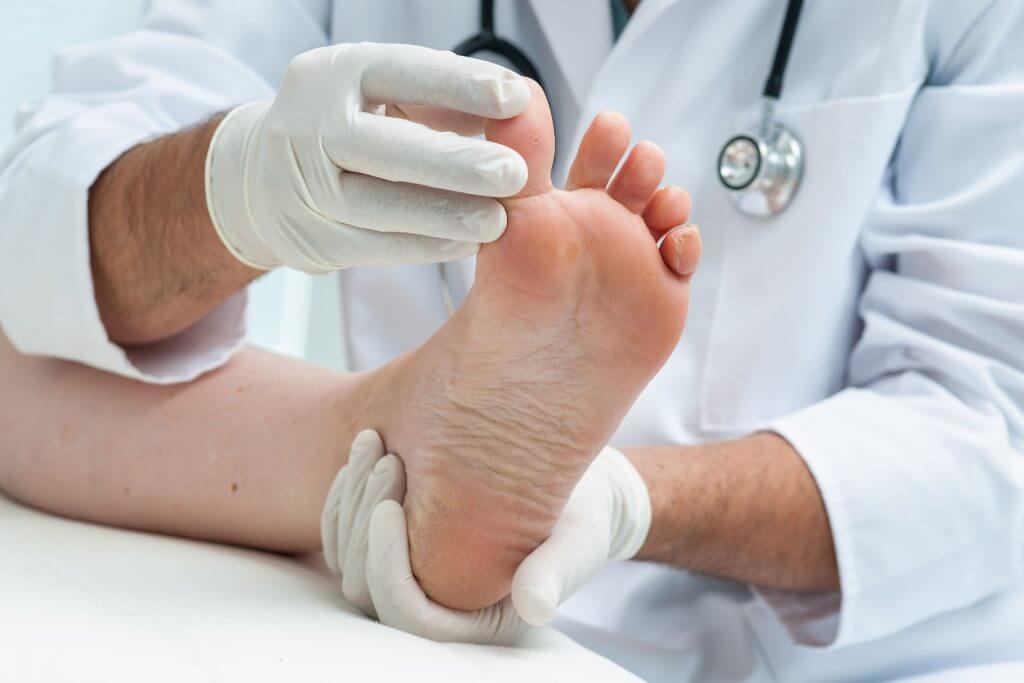
What Is Peripheral Neuropathy
Peripheral neuropathy is when nerves outside of the brain and spinal cord (peripheral nervous system) become damaged. This causes weakness, numbness, and pain that usually manifests in hands or feet; it may also interfere with digestion, urination, and circulation.
Your peripheral nervous system relays information from your brain to the spinal cord (central nervous system) and beyond. In addition, peripheral nerves also send sensory information back to the central nervous system.
Peripheral neuropathy may be caused by traumatic injuries, infections, or metabolic issues; diabetes being the most frequent culprit.
Peripheral neuropathy sufferers usually describe their pain as stabbing or burning. Treatment for peripheral neuropathy typically improves symptoms, with medication helping reduce the intensity of the sensation caused by this disorder.
Signs
Each nerve in your peripheral system performs a specific role. Therefore, symptoms will differ depending on which nerves are affected. There are three kinds of peripheral nerves:
- Sensory nerves are responsible for sensing bodily sensations like temperature, pain, and vibration.
- Motor nerves control muscle movement.
- Autonomic nerves control bodily functions like blood pressure, perspiration, and heart rate.
These signs and symptoms could be indicative of peripheral neuropathy.
- Starting on your feet and hands, you may experience an increasing tingling sensation that spreads to other body parts, such as your arms, legs, or upper body.
- Experience sharp, intense, throbbing, or burning pain
- Extreme Touch Sensitivity
- Feeling pain from activities you weren’t expecting, such as placing weight on your feet or being covered in blankets.
- Lack of coordination can cause you to trip and fall.
- Muscle Weakness
- Feeling like you’re wearing socks or gloves when in fact, you aren’t
- Paralysis if motor nerves are affected
Signs and symptoms that could indicate an autonomic nerve problem include:
- Heat intolerance
- Excessively or inadequate sweating.
- Bowel, bladder, or digestive problems
- Drop in blood pressure, dizziness, and lightheadedness.
Peripheral neuropathies can manifest as one nerve (mononeuropathy), multiple mononeuropathies in one area (multiple mononeuropathy), or many nerves at once (polyneuropathy). Mononeuropathy is one example; people with peripheral neuropathy also tend to have polyneuropathy.

When Should You See a Doctor?
Suppose you experience unusual tingling, weakness, or pain in your feet or hands. In that case, it is imperative to seek medical help right away. Early treatment and diagnosis are the best ways to manage symptoms and protect your peripheral nervous system from further harm.
Causes
Peripheral neuropathy, also known as nerve damage, can be caused by various conditions. Some common ones include:
- Autoimmune diseases include Sjogren’s syndrome, Lupus, Rheumatoid Arthritis, Guillain-Barre syndrome, Chronic Inflammatory Demyelinating Polyneuropathy, and Vasculitis can all be devastating to one’s well-being.
- Diabetes is the leading cause of neuropathy. More than 50% of those with diabetes will eventually develop neuropathy.
- Infections. Examples include Lyme disease, shingles, and Epstein-Barr virus.
- Charcot-MarieTooth disease and other neuropathy disorders are inherited.
- Tumors. Tumors can form on nerves. Polyneuropathy may also be caused by certain cancers that weaken the body’s immune system – these are part of paraneoplastic syndrome, a degenerative disorder.
- Bone marrow diseases. These may include abnormal blood proteins (monoclonal Gammopathies), myeloma, lymphoma, and amyloidosis – a rare but deadly disorder.
- Other diseases to watch out for include liver disease, kidney disease, connective tissue disorders, and hypothyroidism (hypothyroidism).
Neuropathies may also be caused by:
Alcoholism
People suffering from alcoholism often make poor dietary decisions, leading to vitamin deficiencies.
Exposure to poisons
Toxic substances include industrial chemicals and heavy metals like lead and mercury.
Medications
Peripheral neuropathy may be caused by certain medications, particularly those used to combat cancer (chemotherapy).
Nerve Injury or Pressure
Peripheral nerves can be damaged or severed by injuries such as motor vehicle accidents, falls, and sports activities. Nerve pressure may also result from crutches, wearing a cast, or performing repetitive motions like typing.
Vitamin Deficiencies
Nerve health requires adequate amounts of B vitamins, such as B-1 through B-6 and B-12; vitamins E and Niacin are also essential.
Risk Factors
Potential risks for peripheral neuropathy include:
- Diabetes can be a life-threatening condition if not properly managed.
- Alcohol Misuse
- Vitamin Deficiencies, Particularly B Vitamins
- Lyme disease, shingles, and Epstein-Barr virus are all potential infections. Hepatitis B, C, and HIV may also present.
- Autoimmune diseases like Lupus and Rheumatoid Arthritis occur when your immune system mistakenly attacks healthy tissues.
- Thyroid, liver, and kidney disorders.
- Exposure to Toxins
- Specific jobs necessitate repetitive motion.
- Family history having neuropathy
Complications
Peripheral neuropathy may lead to several severe medical conditions, including:
- Burns and other skin injuries: May leave you numb in some parts of your body, making temperature changes or pain sensations challenging to detect.
- Infection: Unconscious injuries to feet or other areas without sensation can happen without warning, so it’s essential to check for conditions regularly and treat minor wounds promptly if they become infected.
- Falls: Loss of balance and falling can lead to weakness and numbness in the affected area.

Book Your Appointment
If you or a loved one suffers from peripheral neuropathy and traditional treatments have not provided relief, it’s time to consider ketamine infusion therapy. Ketamine is a safe and effective treatment for chronic pain, including the neuropathic pain associated with peripheral neuropathy. Don’t let pain control your life any longer – schedule a consultation with Florida Medical Pain Management to discuss the benefits of ketamine infusion therapy for peripheral neuropathy pain management. Take control of your pain and start living the life you deserve.
Our Treatment Services
Florida Medical Pain Management’s top priority is serving our patients’ needs and creating long-lasting relationships with them. Our treatments include:
- Treatment for Neuropathy
- Arthritis Management
- Back Pain Medication
- Chronic Pain Treatments
- PRP Injections
- Epidural Injection
- Regenerative Medicine
- Hip Pain Medication
- Ketamine Infusion Therapy
We want to help patients live more fulfilling and productive lives by effectively managing their pain. Florida Medical Pain Management also provides home therapy and many more. Click here to see our other services.















